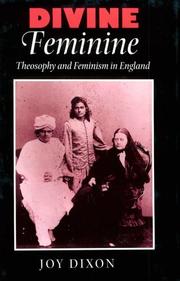| Listing 1 - 2 of 2 |
Sort by
|
Book
ISBN: 9780674504233 Year: 2015 Publisher: Cambridge, Mass. Harvard University Press
Abstract | Keywords | Export | Availability | Bookmark
 Loading...
Loading...Choose an application
- Reference Manager
- EndNote
- RefWorks (Direct export to RefWorks)
Many women were at the vanguard in the era of the scientific revolution, deeply invested in empirical culture, yet their names are largely unknown. Ray's study begins with Caterina Sforza's alchemical recipes; examines the sixteenth-century vogue for "books of secrets"; and looks at narratives of science in works by Moderata Fonte and Lucrezia Marinella. It concludes with Camilla Erculiani's letters on natural philosophy and, finally, Margherita Sarrocchi's defense of Galileo's "Medicean" stars. Her book rethinks early modern science, properly reintroducing the integral and essential work of women. "The era of the Scientific Revolution has long been epitomized by Galileo. Yet many women were at its vanguard, deeply invested in empirical culture. They experimented with medicine and practical alchemy at home, at court, and through collaborative networks of practitioners. In academies, salons, and correspondence, they debated cosmological discoveries; in their literary production, they used their knowledge of natural philosophy to argue for their intellectual equality to men. Meredith Ray restores the work of these women to our understanding of early modern scientific culture. Her study begins with Caterina Sforza's alchemical recipes; examines the sixteenth-century vogue for "books of secrets"; and looks at narratives of science in works by Moderata Fonte and Lucrezia Marinella. It concludes with Camilla Erculiani's letters on natural philosophy and, finally, Margherita Sarrocchi's defense of Galileo's "Medicean" stars. Combining literary and cultural analysis, Daughters of Alchemy contributes to the emerging scholarship on the variegated nature of scientific practice in the early modern era. Drawing on a range of under-studied material including new analyses of the Sarrocchi-Galileo correspondence and a previously unavailable manuscript of Sforza's Experimenti, Ray's book rethinks early modern science, properly reintroducing the integral and essential work of women." -- Publisher's description
Women in science --- Women scientists --- Science --- Women --- Alchemy. --- History, Early Modern 1451-1600. --- Early Modern History (Medicine) --- Early Modern History of Medicine --- Early Modern Medicine --- History of Medicine, Early Modern --- History, Early Modern --- Medicine, Early Modern --- Early Modern History --- Early Modern Histories (Medicine) --- Histories, Early Modern (Medicine) --- History, Early Modern (Medicine) --- History, Early Modern 1451 1600 --- Modern Histories, Early (Medicine) --- Modern History, Early --- Modern History, Early (Medicine) --- Modern Medicine, Early --- Chemistry --- Scientists --- Minorities in science --- History. --- history. --- Italy. --- Sardinia --- History of chemistry --- alchemy --- alchemists --- Marinella, Lucrezia --- Sforza, Caterina --- Sarrocchi, Margherita --- Fonte, Moderata --- Erculiani, Camilla --- Cortese, Isabella --- anno 1500-1599 --- anno 1600-1699 --- Italy --- Alchemy --- History, Early Modern 1451-1600 --- History --- history --- Astronomy --- Body care --- Literature --- Medical sciences --- Intellectuals --- Writers --- Academic sector --- Book --- Epistemology

ISBN: 0801875307 9780801875304 0801864992 9780801864995 Year: 2001 Volume: 119th ser., 1 Publisher: Baltimore, Md. : Johns Hopkins University Press,
Abstract | Keywords | Export | Availability | Bookmark
 Loading...
Loading...Choose an application
- Reference Manager
- EndNote
- RefWorks (Direct export to RefWorks)
Divine Feminine is the first full-length study of the relationship between alternative or esoteric spirituality and the feminist movement in England. Historian Joy Dixon examines the Theosophical Society's claims that women and the East were the repositories of spiritual forces which English men had forfeited in their scramble for material and imperial power. Theosophists produced arguments that became key tools in many feminist campaigns. Many women of the Theosophical Society became suffragists to promote the spiritualizing of politics, attempting to create a political role for women as a way to "sacralize the public sphere." Dixon also shows that theosophy provides much of the framework and the vocabulary for today's New Age movement. Many of the assumptions about class, race, and gender which marked the emergence of esoteric religions at the end of the nineteenth century continue to shape alternative spiritualities today.
Feminism --- Emancipation of women --- Feminist movement --- Women --- Women's lib --- Women's liberation --- Women's liberation movement --- Women's movement --- Social movements --- Anti-feminism --- History. --- Religious aspects --- Theosophical Society (Great Britain) --- History of doctrines. --- Emancipation --- Theosophical Society in England --- Theosophical Society in England and Wales --- Esoteric sciences --- Sociology of the family. Sociology of sexuality --- Community organization --- Sexology --- Great Britain --- Esotericism --- Sexuality --- Women's suffrage --- Book --- the occult --- political alchemy --- New Age --- feminism --- ancient wisdom --- theosophy
| Listing 1 - 2 of 2 |
Sort by
|

 Search
Search Feedback
Feedback About UniCat
About UniCat  Help
Help News
News